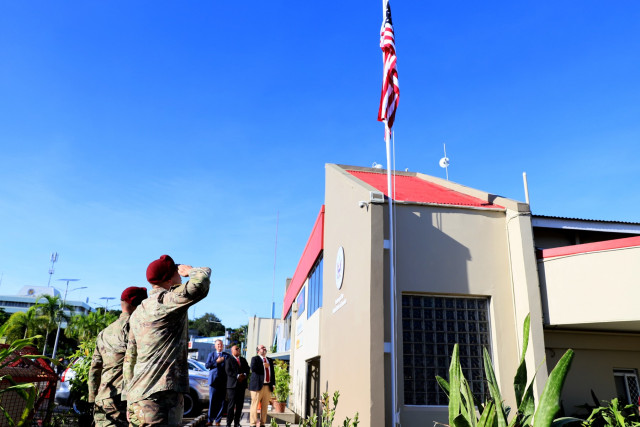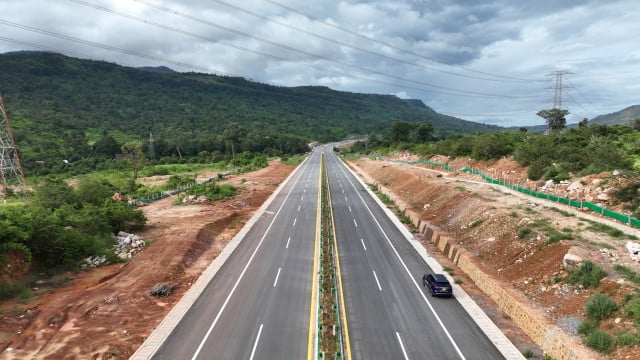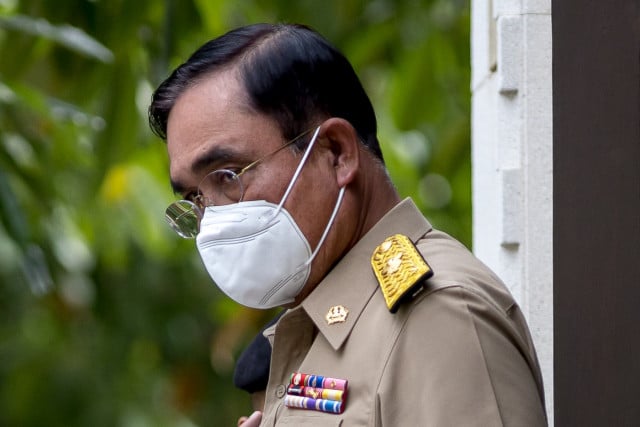Police Surround Demonstrators as NagaWorld Staff Strike over Union Busting
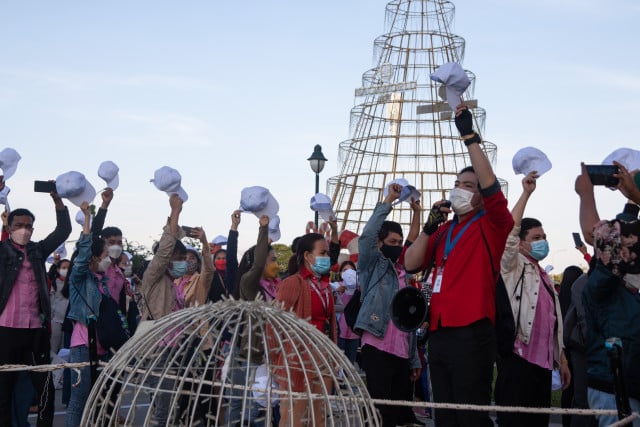
- By Gerald Flynn
- and Phoung Vantha
- December 19, 2021 12:45 PM
A strike among NagaWorld staff and former employees saw riot officers deployed to contain the peaceful demonstration that aimed to reinstate employees fired earlier this year and redress workers’ rights abuses
PHNOM PENH--Between 700 and 1,000 staff and former employees of Phnom Penh’s NagaWorld went on strike on Dec. 18 to protest the casino’s targeting union representatives in layoffs.
Protected from the 7 a.m. sun by umbrellas, the exact number of current staff and former staff remaining unclear, Labor Rights Supported Union of Khmer Employees of NagaWorld (LRSU) issued a nine-point set of demands largely related to the dismissal of employees—most of whom were union leaders and activists.
LRSU demanded that NagaWorld reinstate 365 employees who have so far refused the casino’s termination package and added that severance pay needed to be properly calculated for the 1,329 employees who were laid off in April 2021. LRSU complained at the time that the layoffs targeted union members, long-term employees whose benefits were deemed expensive, along with pregnant and injured staff members.
The strike, which began at 7 a.m., was declared illegal by the Phnom Penh Court of First Instance around 10 a.m. with Judge Ros Piseth who—according to an unofficial court transcript produced by the labor rights group CENTRAL—deemed the strike illegal and threatened current employees of NagaWorld involved in the strike of “serious misconduct” if they did not return to work within 48 hours.
Mohan Tirugmanasam Bandam, publisher of Khmer Times, was present as Judge Piseth’s judgment regarding the strike was read out.
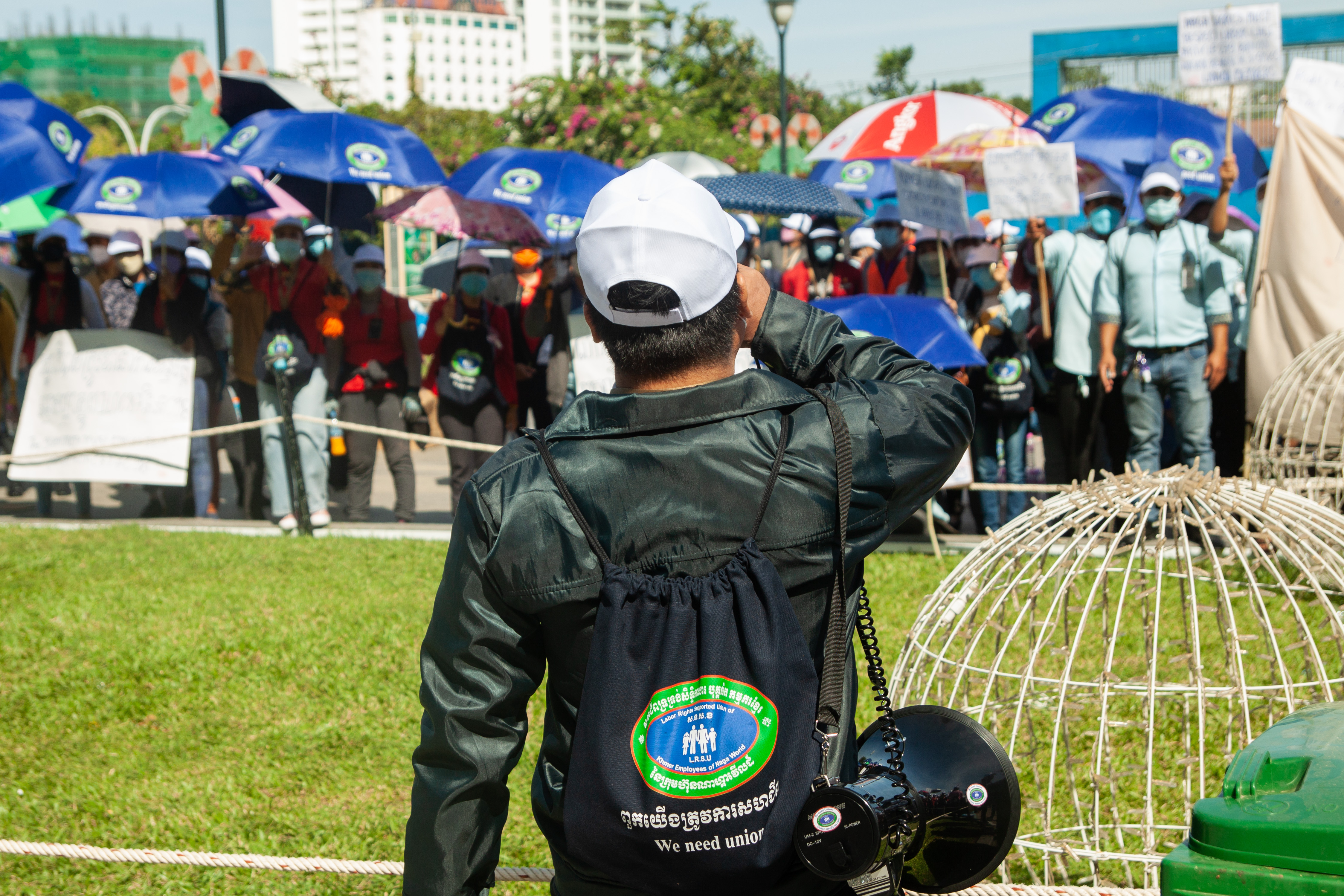
Seng Vannarith, who had worked at NagaWorld for 25 years and had reached the position of pit boss by the time he was fired in April 2021, said he was not worried about being arrested.
“All the workers will stand together until there is a solution,” said Vannarith, whose wife was also fired in April 2021.
The official reason for the couple being fired was NagaWorld seeking to stabilize the casino after raking in $102.3 million in net profits for 2020.
“The truth is the company is not going to go bankrupt,” said Vannarith, adding that salaries were suspended in mid-March 2021 and since then, the casino has refused to let staff work full-time, paying them only for days worked rather than salaries.
The COVID-19 pandemic was the root cause that NagaWorld cited to justify the layoffs, but Vannarith pointed to the company’s profitability in the years prior to the pandemic, its generosity when donating millions for the government’s fight against COVID-19 and the continued $3.5 billion construction of Naga 3 in Phnom Penh.
NagaWorld’s parent company, NagaCorp, reported net profits of $521.3 million in 2019, $390.6 million in 2018 and more than $136 million each year since 2014. An interim report from NagaCorp for the first half of 2021 showed that while gross profits stood at $74.7 million, the gambling giant actually recorded a net loss of $77.2 million, which the company chalked up to the “voluntary temporary suspension of business operations because of COVID-19 concerns since 2 March 2021.”
“If the company still has money for all this, then they have money to pay their staff,” Vannarith said. “They didn’t need to fire us, they just wanted to break the union.”
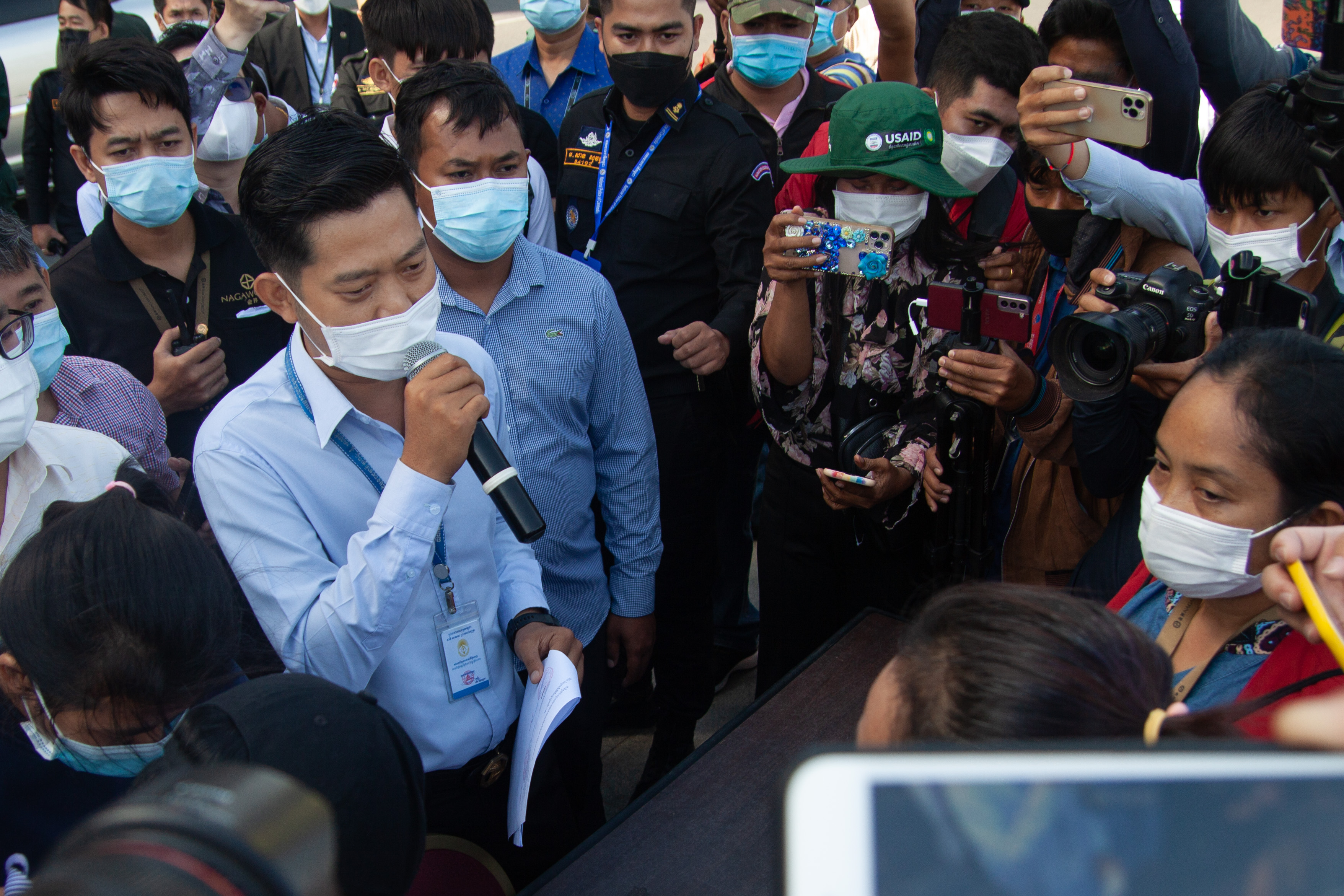
Union Busting the Norm at NagaWorld
NagaCorp’s hostile approach to unions is well-documented. Chhim Sithar, the leader of LRSU, was fired for her union work that revolved around asking for better pay and better conditions for staff—she was reinstated only following protests in 2020.
According to Te Molika who, despite still being employed at NagaWorld after 10 years of service, was present at the strike on Dec. 18, the conditions have scarcely improved over the years, but the union has obtained her and her colleagues better pay.
“In 2011, I was earning just $110 per month, now I take home $427 each month, but this was not easy to achieve: If we didn’t have our union, it wouldn’t improve,” she said. “We deal with customers who get violent when they lose, they spray hand sanitizer in our eyes, they throw drinks—even hot ones—in our faces and still the company tells us to be more respectful. This is why we need a union who understands these issues. If we act alone, it doesn’t work.”
Molika had joined the strike on Dec. 18 to push for the second reinstatement of union leader Sithar, who was among the 1,329 fired earlier this year, fearing that the gambling company would further dismantle the union in Sithar’s absence.
“I don’t worry about getting fired,” she said, noting that there is no other gambling employer in Phnom Penh due to NagaCorp’s exclusive license to a 200-kilometer radius of the Cambodian capital until 2045. “If I was scared, I wouldn’t be here and then nothing would change. It’s impossible to make change alone, we need our colleagues back.”
Attempts to discuss the strike with NagaWorld’s assistant director of marketing communications Melanie Loong—who is listed among NagaWorld’s media contacts—were unsuccessful after Loong had patched reporters’ call through a woman who would only identify herself as Claudia.
Claudia said that NagaWorld had no more information available on the strike but promised to provide more information at an unspecified date.
NagaWorld’s union overwhelmingly supported the strike, with more than 97 percent of the 1,653 workers voting in favor on the nine-point demands, following the announcement by the union that the Ministry of Labor on Dec. 14 had supported NagaWorld’s claims that it had acted within the law firing staff in April 2021.
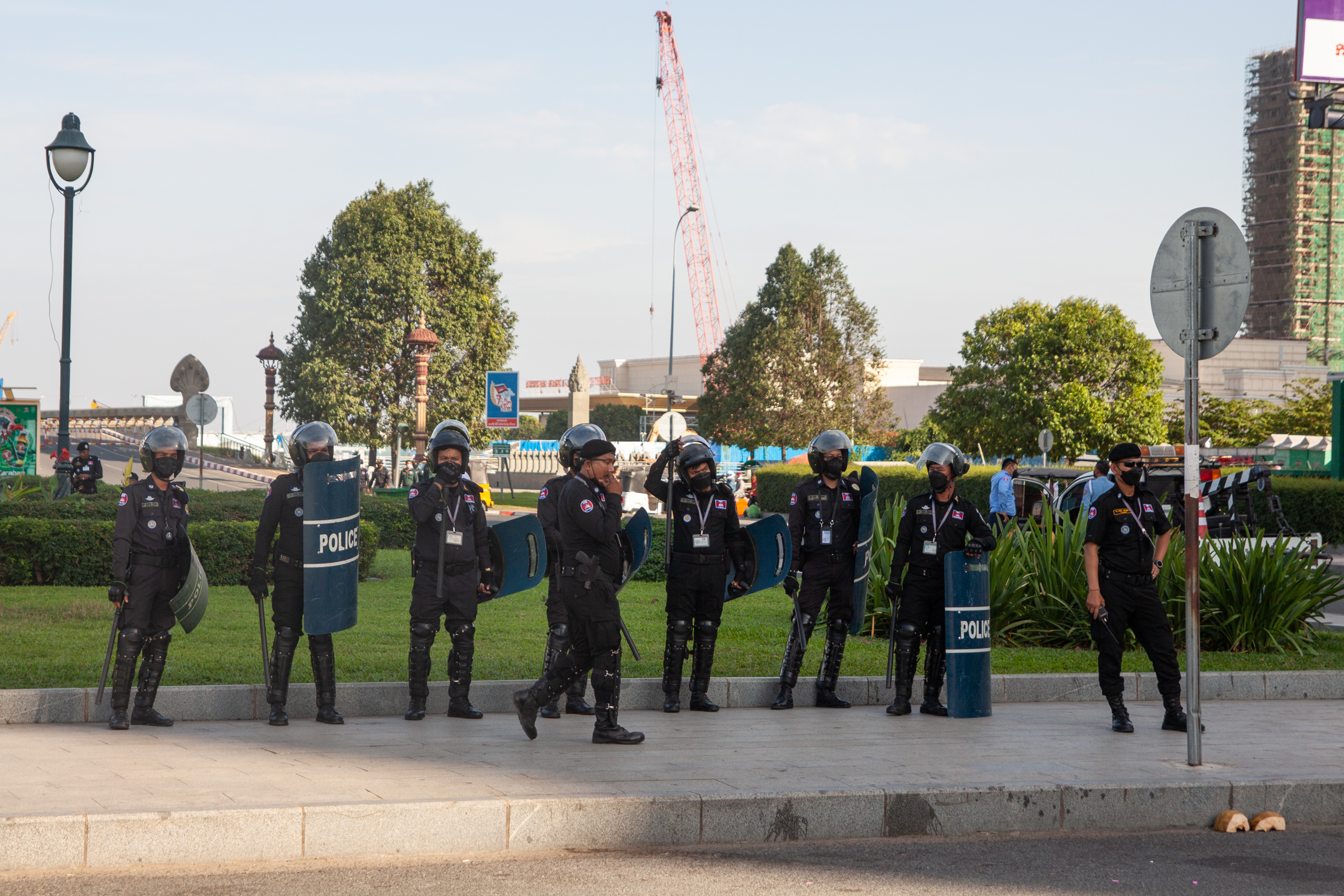
A series of three meetings among unionists on Dec. 15 led to the decision to strike being made, despite last minute attempts by the Phnom Penh Municipal Authorities that, on Dec. 17, requested the union delay the strike.
As such, the strike went ahead and while the morning saw largely peaceful demonstrators shelter from the sun under umbrellas while NagaWorld’s own private security forces glared at them from under the shade of the casino, the afternoon saw tensions ratcheted up after Phnom Penh police attempted to arrest union leader Sithar—who was not present at the strike—and were ultimately not successful.
No arrest warrant appears to have been issued as of press time and the police’s actions seem to stem from Judge Piseth’s injunction ruling that the strike was illegal. Following the strike, Fresh News published a Facebook post which suggested that Sithar had been trained by foreign agents and anti-government factions.
However, shortly after the failed attempt to detain Sithar, police blockaded the striking NagaWorld staff and former employees in, cutting off exits and deploying riot police.
Phnom Penh Authorities’ Show of Force
Security forces and police officers from a wide range of units suddenly appeared, numbering more than 100 and riding through the road that passes in front of Naga 1 in 12 trucks, at least two of which were identified by rights observers as Ministry of Interior, while others bore riot shields and tested their batons against combat boots.
The many-headed display of power and the sudden surge of police officers on the grounds of a peaceful demonstration, however, did little to quell the unionists’ spirit, who took to singing Professor Nuon Kan’s Khmer Chronicle and intermittently breaking into jubilant cheers.
Surrounding what remained of the strike, police gave the protesters until 4 p.m. to disperse, but the message—delivered by a megaphone attached to the back of a police vehicle—was met with more displays of solidarity from the unionists, who refused to budge.
More police arrived, but somehow managed to confuse the situation by attempting to drown one another out with competing megaphones. The distorted messages led to confusion among those present as one unit maintained that the deadline for breaking the strike was set at 4 p.m. while another police truck suggested that the protest could now last until 5 p.m., and the minutes leading up to 4 p.m. grew quiet and tense as police flexed their batons, shields and firearms before the crowd of unarmed workers.
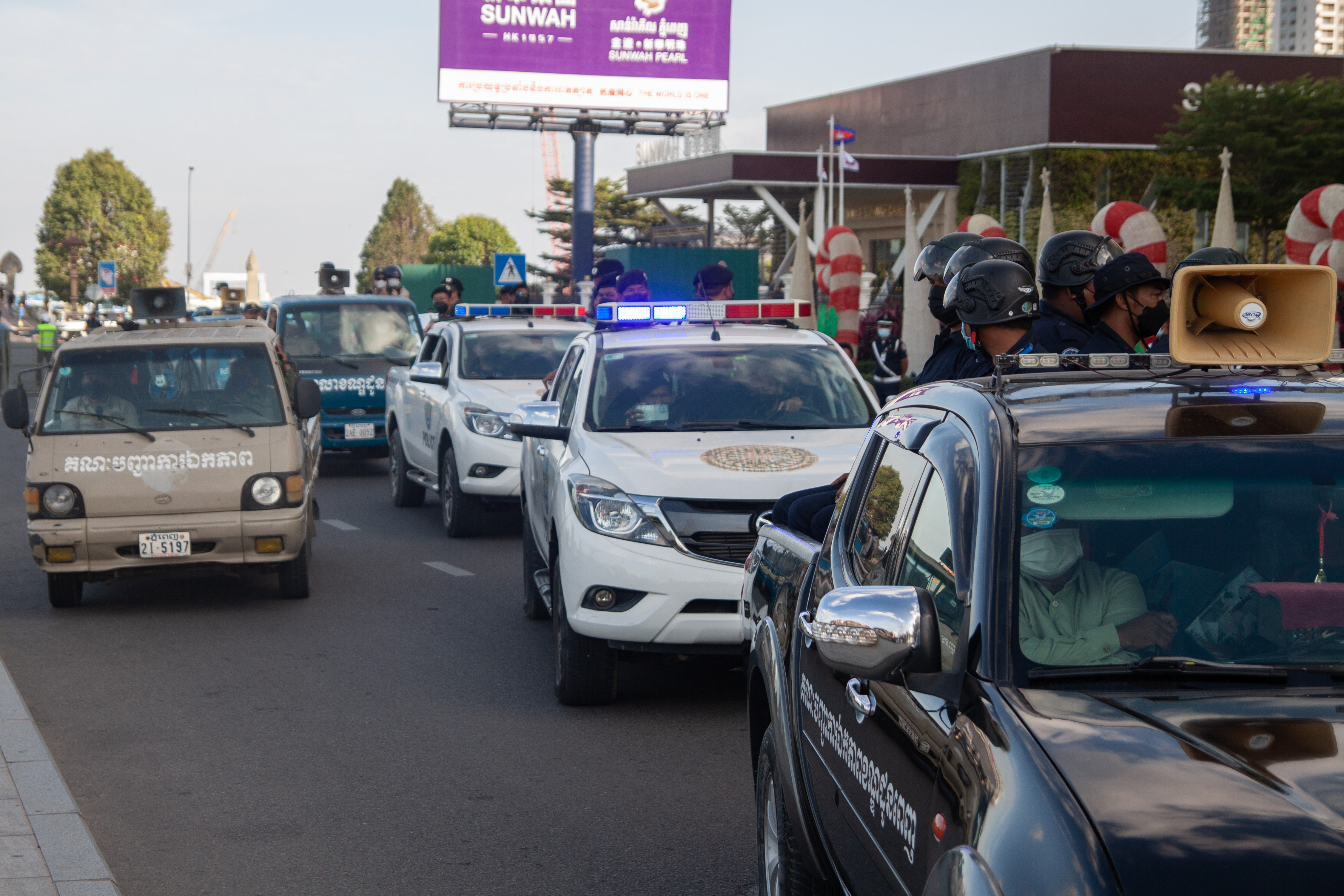
Mostly consisting of women, the crowd had thinned considerably since the morning, but many workers were barred from re-entering the strike after having gone to the bathroom prior to the police barricade being erected.
After 4 p.m. came and went without violence, the multitude of police officers and security forces managed between them to confirm that the new deadline for dispersion was 5 p.m., which—when eventually cobbled together from various police bullhorns—was met with raucous cries from the crowd.
Police sat forlorn while plain clothes officers and Ministry of Interior officials attempted to reason with the striking workers, but it was not until sometime past 4.30 p.m. that the union representatives announced through their own megaphone that the strike would end at 5 p.m. in accordance with Phnom Penh Municipality regulations.
As such, those who had endured the sun, the police barricade and the intimidating show of force from the authorities since 7 a.m. once again burst into song before peacefully filing out of the newly opened police barricades at 5 p.m.
“See you tomorrow” protesters shouted as they walked out, although unconfirmed reports from rights activists have suggested a police strategy to seal off Naga 1 prior to the strike’s planned resumption at 7 a.m. on Dec. 19, 2021.
“If They Stand Strong, The Strike Will Succeed”
“I would say that the people running the casino, they don’t respect human rights: They’re in the gambling business,” said Moeun Tola, director of the labor rights group CENTRAL. “While it’s not strange for a casino to abuse labor and human rights, the government needs to regulate that business in accord with the International Labor Organization, the freedom of trade unions and collective bargaining.”
Tola noted that NagaWorld had already smashed three unions since its initial construction, but that this latest dispute stemmed from LRSU’s proposal on collective bargaining, which he said is guaranteed under Article 89 of the Labor Law and in the Constitution.
As such, the impunity with which NagaWorld has been able to attack unionists and the support it receives from government-friendly news outlets has led Tola and other rights advocates to question the links between the casino’s billionaire owner Chen Yepern and ruling party members.
“The terminated union activists were all engaged in wage bargaining when they were dismissed, so it leaves big questions marks,” said Tola.
He also pointed out that NagaWorld’s plot of land in Phnom Penh is close to encroaching on the Buddhist Institute’s land and that the two share a wall. “Religion is one third of our national motto,” he said. “It’s a really bad look having a casino next to our Buddhist Institute.”
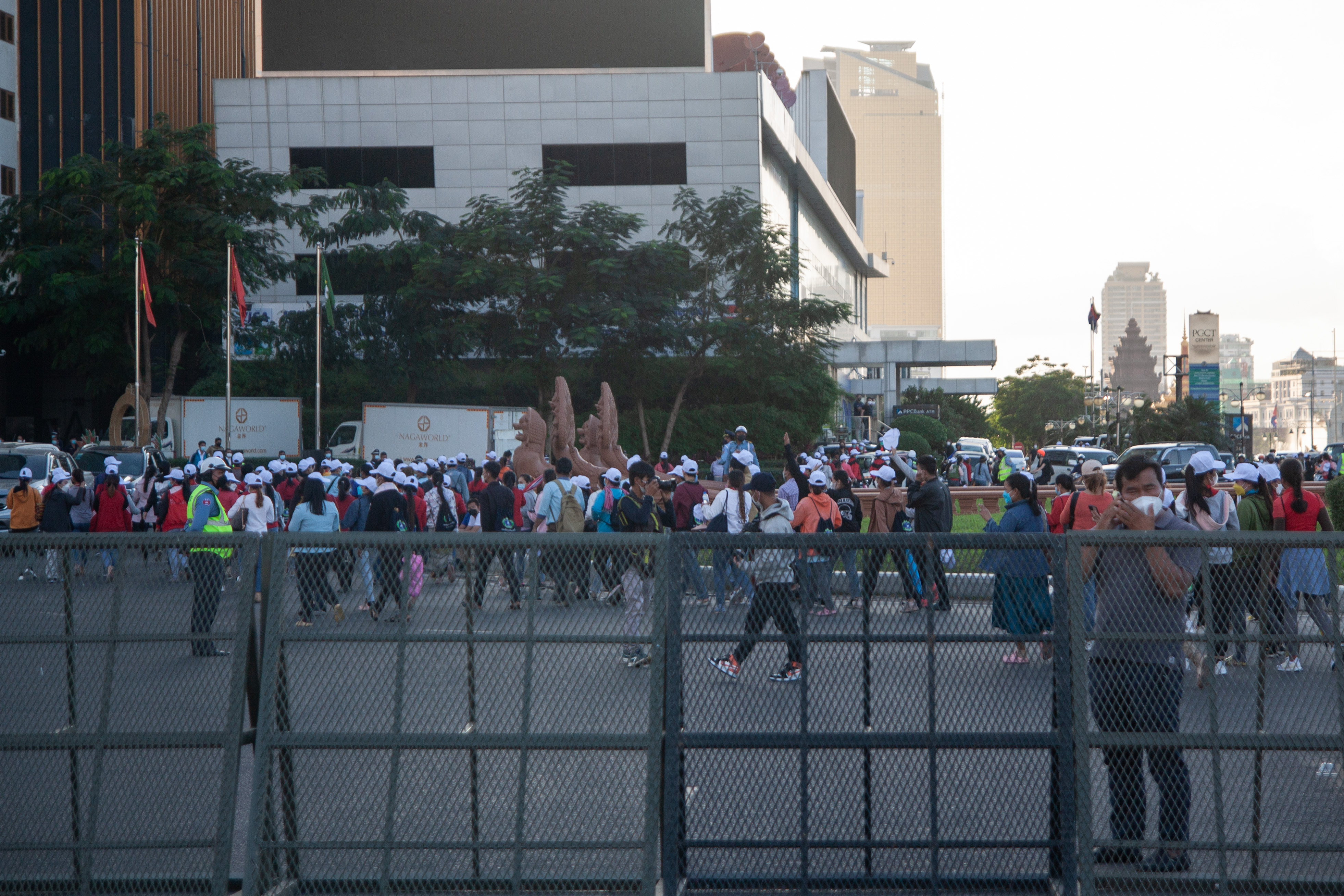
Tola, whose team has closely followed the case of dismissed unionists at NagaWorld, condemned the Ministry of Labor’s approval of NagaWorld’s actions and called on the authorities to stop picking a side and instead to do their jobs as independent arbiters.
The Ministry of Labor, on Dec. 18, condemned the NagaWorld strike on the grounds that the court had ruled it illegal, but the lack of separation between powers and Cambodia’s lack of independent judiciary makes it hard to know where these decisions come from.
“I see the government taking the side of the company and NagaWorld…but the important thing is that the workers are showing solidarity,” Tola concluded. “There are some 8,000 staff at NagaWorld, if they stand strong, the strike will succeed.”
As of early Dec. 19, police had blocked off Naga 1 and protesters had spread around the area.






